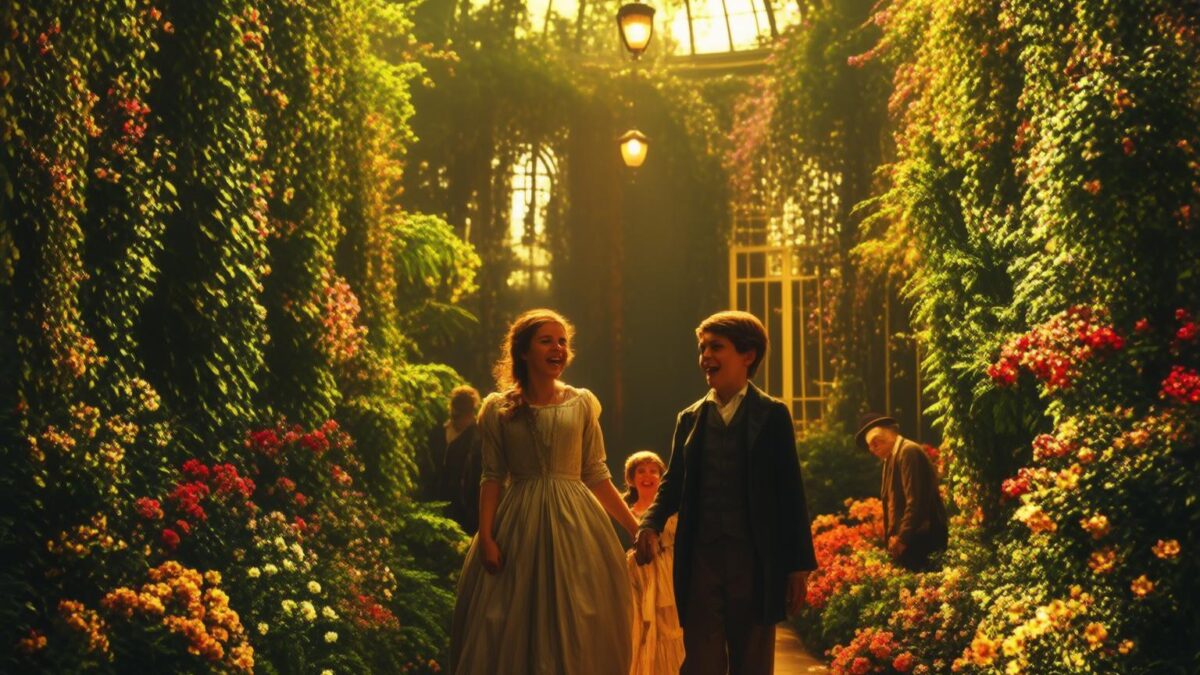※カラフル対訳で紹介している作品はすべてパブリックドメインです。
このサイトで使われている作品のすべては著作権の切れた名作などの全文を電子化して、インターネット上で公開しているProject Gutenberg(プロジェクト・グーテンベルク)、LibriVox(リブリヴォックス、朗読図書館)の作品を出典としています。
翻訳者:kie_takazawa
The old gentleman did not say much as he drank his four cups of tea, but
老紳士は4杯ものお茶を飲み、多くを語らなかったが
he watched the young people, who soon chatted away[雑談・談笑する] like old friends, and the change in his grandson did not escape him.
目の前の若者たちがすぐに古い友達のように打ち解けておしゃべりするのを見て、孫の変化を見逃さなかった。
There was color, light, and life in the boy’s face now, vivacity in his manner, and genuine[正真正銘の] merriment in his laugh.
今の少年の顔は明るく生き生きとしていて、態度には活発さがあり、笑いには心からの陽気さがあった。
“She’s right, the lad[少年] is lonely. I’ll see what these little girls can do for him,” thought Mr. Laurence, as he looked and listened.
「あの娘の言う通りだ、この子は寂しいのだ。この娘たちがこの子のために何ができるのか見てみよう」と見聞きしながらローレンス氏は思った。
He liked Jo, for her odd, blunt ways suited him, and she seemed to understand the boy almost as well as if she had been one herself.
彼はジョーが好きだった。彼女の風変わりな、ぶっきらぼうなやり方が彼の性に合っていたからで、まるで自分のことのように、彼女はその少年を理解しているようだった。
If the Laurences had been what Jo called ‘prim[いやに上品ぶる] and poky[元気のない]‘, she would not have got on[はかどる] at all, for such people always made her shy and awkward.
もしローレンス氏がジョーが言うところの「堅苦しくて偏屈」だったら、彼女はまったくうまく出来なかっただろう。そういう人たちの前ではいつも恥ずかしがって、ぎこちなくなってしまうのだ。
But finding them free and easy, she was so herself, and made a good impression.
(ローリーとローレン氏は)とても心安く、畏まることもないと分かったジョーは、自然体でいられたし[彼女は彼女らしくいられたし]、とても良い印象を与えた。
When they rose she proposed[提案する] to go,
ジョーがそろそろお暇しなければと腰を上げた時、
but Laurie said he had something more to show her, and took her away to the conservatory, which had been lighted for her benefit.[利益]
ローリーはもっと見せたいものがあると言い、彼女のために明かりを灯しておいた温室に連れて行った。
It seemed quite fairylike to Jo, as she went up and down the walks,[上がり下りする] enjoying the blooming walls on either side, the soft light, the damp sweet air,
温室は妖精の住処のように思えた。行ったり来たりしながら、両側の壁には花々が咲き、柔らかな光、湿った甘い空気をジョーは楽しんだ。
and the wonderful vines and trees that hung about[垂れる] her, while her new friend cut the finest[素晴らしい, 見事な] flowers till his hands were full.
見事なツルや木々がジョーの上にしなだれ、ジョーの新しい友人は両手いっぱいの最高級の花々を摘んで[切って]くれた。
Then he tied them up,[縛り上げ] saying, with the happy look Jo liked to see, “Please give these to your mother, and tell her I like the medicine she sent me very much.”
ローリーは花束を作りながら、ジョーが見たがっていたとても幸せそうな表情で言った。「これをあなたのお母さまに。そして素晴らしいお薬をありがとうございますと伝えてください」
They found Mr. Laurence standing before the fire in the great drawing room, but Jo’s attention was entirely absorbed by[~に吸収される] a grand piano, which stood open.
二人は大居間の暖炉の前に立っているローレンス氏を見つけたが、ジョーの注意は完全に、蓋が開いたままのグランドピアノに夢中になっていた。
“Do you play?” she asked, turning to Laurie with a respectful expression.
「ピアノを弾くの?」とジョーは尊敬の面持ちでローリーに尋ねた。
“Sometimes,” he answered modestly.
「時々」と彼は謙遜して言った。
“Please do now. I want to hear it, so I can tell Beth.”
「弾いてみてくださらない。聞きたいわ。そしたらベスに話して上げられるもの」
“Won’t you first?”
「ではあなたから?」
“Don’t know how. Too stupid to learn, but I love music dearly.”
「私は弾けないのよ。才能がないのね[学ぶには愚かすぎる]。でも音楽はとっても好きよ」
So Laurie played and Jo listened, with her nose luxuriously buried in heliotrope and tea roses.
ローリーはピアノを弾き、ジョーはヘリオトロープ とティーローズ
とティーローズ の豊かな香りに埋もれ、演奏を楽しんだ。
の豊かな香りに埋もれ、演奏を楽しんだ。
Her respect and regard for the ‘Laurence’ boy increased very much, for he played remarkably[著しく] well and didn’t put on any airs.[なんの空気も醸し出さない]
ジョーの「ローレンス」少年への尊敬と敬意の念はとても大きくなった。ローリーの演奏はとても素晴らしく、それなのに気取ったところがないのだから。
She wished Beth could hear him, but she did not say so, only praised him till he was quite abashed, and his grandfather came to his rescue.
ジョーはベスが彼の演奏を聴けたらなぁと思ったが、そうは言わず、ローリー困ってしまうくらい褒め【る】ちぎったので、彼の祖父が助け船を出した。
“That will do, that will do, young lady. Too many sugarplums[糖菓, あめ玉] are not good for him.
「もう十分ですよ、お嬢さん。あまり褒めすぎるとよくないですからな。
His music isn’t bad, but I hope he will do as well in more important things.
彼の弾くピアノは悪くはないが、もっと大切な事をがんばって欲しいものだ。
Going? well, I’m much obliged[感謝する] to you, and I hope you’ll come again. My respects to your mother.[お母さまに敬意を表します] Good night, Doctor Jo.”
お帰りかな?大変助かりましたよ。また来てくださいよ。お母さまによろしくお伝えください。おやすみなさい、ジョー先生」
He shook hands kindly, but looked as if something did not please him.
ローレンス氏は優しく握手をしたが、何かが気に障っているように見えた。
When they got into the hall, Jo asked Laurie if she had said something amiss. He shook his head.
二人がホールに入ると、ジョーはローリーに何か不都合なことを言ってしまったかしらと尋ねた。彼は首を振った。
“No, it was me. He doesn’t like to hear me play.”
「いいえ、僕のせいです。おじい様は僕がピアノを弾くのが好きじゃないんですよ」
“Why not?”
「なぜ嫌なの?」
“I’ll tell you some day. John is going home with you, as I can’t.”
「いつかお話します。僕はお送りできないので、ジョンがおうちまでご一緒します」
“No need of that. I am not a young lady, and it’s only a step. Take care of yourself, won’t you?”
「いいのよ。私貴婦人じゃないんだから。それにすぐそこだし。体に気を付けてね、わかった?」
“Yes, but you will come again, I hope?”
「はい、でもまた来てくれますね?そうして欲しいな」
“If you promise to come and see us after you are well.”
「もしあなたが元気になって、私たちに会いに来てくれると約束してくれるなら」
“I will.”
「行きますとも」
“Good night, Laurie!”
「おやすみなさい、ローリー!」
“Good night, Jo, good night!”
「おやすみなさい、ジョー、おやすみ!」
When all the afternoon’s adventures had been told, the family felt inclined to go visiting in a body,[一団となって]
午後の冒険が語られた後、家族のみんなが揃って(ローリーの屋敷に)訪れてみたくなった。
for each found something very attractive in the big house on the other side of the hedge.
あの生垣の向こうの大きな屋敷にそれぞれが魅力的に思うものがあるのを知ったからだ。
Mrs. March wanted to talk of her father with the old man who had not forgotten him, Meg longed to walk in the conservatory,
マーチ夫人は自分の父親を覚えていてくれた老人と、父親について話してみたかったし、メグは温室を歩いてみたかった。
Beth sighed for the grand piano, and Amy was eager[しきりに求めて] to see the fine pictures and statues.
ベスはグランドピアノにため息をもらし、エイミーは素晴らしい絵や彫像を見たがった。
“Mother, why didn’t Mr. Laurence like to have Laurie play?” asked Jo, who was of an inquiring disposition.[気性]
「お母さま、どうしてローレンスさんはローリーがピアノを弾くのが嫌なのかしら?」と詮索好きなたちのジョーが尋ねると
“I am not sure, but I think it was because his son, Laurie’s father, married an Italian lady, a musician, which displeased the old man, who is very proud.
「私もよくは知らないのだけれど、でも多分彼の息子さん、ローリーのお父さんのせいだと思うわ。ローリーのお父さんは音楽家のイタリア人女性と結婚したのだけれど、プライドの高い方だから、それが気に食わなかったのでしょう。
The lady was good and lovely and accomplished,[上流社会のたしなみを身につけた] but he did not like her, and never saw his son after he married.
そのご婦人は善良で愛らしく、立派な人だったけれど、彼は彼女が好きになれなくて、結婚してからは一目も息子さんに会わなかったの。
They both died when Laurie was a little child, and then his grandfather took him home.
二人ともローリーが幼い頃にお亡くなりになってしまって、おじい様に引き取られたそうよ。
I fancy[空想する] the boy, who was born in Italy, is not very strong, and the old man is afraid of losing him, which makes him so careful.
イタリア生まれの少年はあまり丈夫ではなく、ご老人は彼を失うことを恐れているから、とても慎重になっているのではないかと思うのよ。
Laurie comes naturally by his love of music, for he is like his mother, and I dare say his grandfather fears that he may want to be a musician.
ローリーは母親に似ているから、自然と音楽が好きになり、おそらくだけど、彼のおじいさまは彼が音楽家になりたいとでも思っているんじゃないかと心配しているのね。
At any rate, his skill reminds him of the woman he did not like, and so he ‘glowered’ as Jo said.”
とにかく、彼の腕前は好きでもない人を思い出させるから、ジョーの言うように 『渋い顔』をしていたのかもしれないわね」
“Dear me, how romantic!” exclaimed Meg.
「なんてロマンチックなの!」とメグは叫んだ。
“How silly!” said Jo. “Let him be a musician if he wants to, and not plague[悩ます] his life out sending[sending out] him to college, when he hates to go.”
「ばかばかしい!」とジョーは言った「音楽家になりたいって言うなら、そうさせればいいのよ、行きたくもない大学に行かせて彼を苦しめないでさ」
“That’s why he has such handsome black eyes and pretty manners, I suppose.
「だから、彼はあんなにハンサムな黒目でお行儀がいいのね。
Italians are always nice,” said Meg, who was a little sentimental.
イタリアの人はたいてい素敵よ」メグが感傷的に言った。
“What do you know about his eyes and his manners? You never spoke to him, hardly,” cried Jo, who was not sentimental.
「あなたが彼の目やマナーについて何を知ってるのよ?ほとんど彼と話したことはないでしょう」と感傷的ではないジョーは叫んだ。
“I saw him at the party, and what you tell shows that he knows how to behave.[どのように振舞うか分かっている]
「パーティーで見たわよ、それにあなたの話から、彼がちゃんとした方だってわかるもの。
That was a nice little speech about the medicine Mother sent him.”
お母さまが彼に送ったお薬という気の利いたスピーチも素敵ね」
“He meant the blanc mange, I suppose.”
「それって、ブラマンジェのことでしょ?」
“How stupid you are, child! He meant you, of course.“
「おバカさん、なんて子供なのかしら!彼が言ったのはあなたのことよ、もちろん」
“Did he?” And Jo opened her eyes as if it had never occurred[浮かぶ, 思い出される] to her before.
「そうなの?」ジョーは全く見当もつかなかったように目を見開いた。
“I never saw such a girl! You don’t know a compliment when you get it,” said Meg, with the air of a young lady who knew all about the matter.
「こんなお子様は見たことないわ!褒め言葉をもらっても、その意味がわからないなんて」とメグは、事のすべてを知っている若い貴婦人のように言った。
“I think they are great nonsense, and I’ll thank you not to be silly and spoil my fun.
「そんなのくだらないわ、それにばかなこと言って私の楽しみを台無しにしてくれてありがとう。
Laurie’s a nice boy and I like him, and I won’t have any sentimental stuff about compliments and such rubbish.[くず, がらくた]
ローリーはとてもいい人だし、私、彼が好きだからそんなお世辞とかそんなくだらないことに感傷的になるようなことはしないわ。
We’ll all be good to him because he hasn’t got any mother, and he may come over[やって来る] and see us, mayn’t he, Marmee[mommy]?”
彼にはお母さんがいないから、私たちはみんな親切にしてあげようよ、彼は私たちに会いに来るかもしれない、そうでしょ、お母さま?」
“Yes, Jo, your little friend is very welcome, and I hope Meg will remember that children should be children as long as they can.”
「そうね、ジョー、あなたの小さな友達は大歓迎だわ。それに、メグ、子供でいられるうちはできる限り子供でいた方がいいということを覚えておいてちょうだい」
“I don’t call myself a child, and I’m not in my teens yet,” observed Amy. “What do you say, Beth?”
「私、自分を子供とは思わない[呼べない]わ。まだ13歳[13歳~19歳]にもなっていないけどね」とエイミーは言った。「ベスはどう思う?」
“I was thinking about our ‘Pilgrim’s Progress’,”[天路歴程] answered Beth, who had not heard a word.
「私、巡礼ごっこのことを考えていたの」とみんなの話を聞いていなかったベスが答えた。
“How we got out of the Slough and through the Wicket Gate by resolving to be good, and up the steep hill by trying,
私たちいい子になることを決心することで、ぬかるみから抜け出して、くぐり門を抜けてきたでしょう。そしてがんばって険しい丘も登ったでしょう。
and that maybe the house over there, full of splendid things, is going to be our Palace Beautiful.”
それで多分、素晴らしいものがたくさんあるあのお屋敷が、私たちの美の宮殿なのじゃないかしらって考えていたの」
“We have got to get by the lions first,” said Jo, as if she rather liked the prospect.[前途, 展望]
「でもその前にライオンの前を通り過ぎないといけないんだよ」とジョーはまるでこの先が楽しみでしょうがないように言った。

